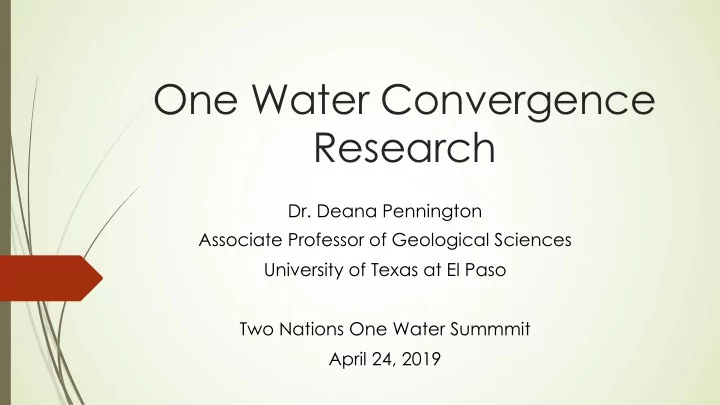

One Water Convergence Research Dr. Deana Pennington Associate Professor of Geological Sciences University of Texas at El Paso Two Nations One Water Summmit April 24, 2019
Agenda ´ Introduce the National Science Foundation’s notion of convergent research ´ Facilitate a group process to brainstorm potential One Water convergent projects 4/26/19
What is Convergent Research? Part I Researcher Thematic Research goal umbrella Research frameworks Multidisciplinary Disciplinary Interdisciplinary Transdisciplinary (2) Transdisciplinary (1) 4/26/19 Tress, Tress & Fry 2002
National Research Council (2014) ´ Multi/Inter/Transdisciplinary - describes the makeup of the team ´ Convergent research is most related to transdisciplinary 4/26/19
NSF ´ Research driven by a specific and compelling problem ´ Deep integration across disciplines => intermingling of knowledge, theories, methods, data, communities, languages => new frameworks, paradigms or even disciplines ´ Convergence describes the process and outcome – the team converges on a comprehensive solution to a problem Example: Map the human genome in ten years Genomics + data mining => bioinformatics 4/26/19
• EMBeRS method: lightly structured process for converging across disciplines & perspectives • Based on learning, organizational, social, and cognitive science theories NSF grants: #OCI-1135525 (2006-07) #OCI-0753336 (2008-10) #OCI-0636317 (2010-13 SESYNC award (2013-15) with NCSE NSF #DGE-1545404 (2015-2019) 4/26/19
Strategy Formal presentations Ad hoc dialogue How NOT to do this No structure Firm structure No progress Little understanding Problems: jargon, lack of basic concepts in other disciplines Solutions: • Participation and turn-taking • Slow down, and watch others – make eye contact • Explain your ideas as if you are talking to an intelligent and interested parent • DON’T use jargon, or if you must, explain it • Active listening: Listen carefully and ask questions if you don’t understand something. • Repeat what you think you understood 4/26/19 • DON’T worry about what you will say when it is your turn!
Overview of the process I will walk you through it! ´ Groups of 4-6 (no fewer) ´ Groups choose a general problem area from the ones provided ´ Individually organize your own thinking about the problem ´ Participatory sharing of ideas ´ Use the large worksheet to co-create a visual diagram combining ideas ´ Report out & reflection on the process ´ Diagrams available at the poster session 4/26/19
5 minutes: Choose a problem area ´ Read the 3 questions provided to you ´ Discuss them at your table ´ Choose one for everyone at your table to focus on 4:00-4:05
10 minutes: Individual ideas ´ Work alone ´ Use provided pen and half sheet of paper ´ Think of an aspect of the problem you know something about ´ Jot down 5-10 keywords about your perspective ´ Draw a diagram of any kind that uses your keywords to convey how you would approach the problem if you were working on it by yourself 4:05-4:15
15 minutes Share your ideas at your table ´ One at a time go around the table ´ 2-3 minutes each, depending on how many are at your table ´ Keep time – don’t use up other’s minutes 4:15-4:30
20 minutes: Co-create a visual ´ Use the large piece of paper and markers ´ Start with the first few words of your focal problem ´ Catalyze societal capacity ´ Transform water infrastructure ´ Empower rural and developing communities ´ Re-envision agriculture ´ Re-image river systems ´ Choose from your collective keywords and ideas to build out from there, grouping similar ideas and drawing relationships across ideas 4:30-4:50
Reflection on the process ´ What things made this activity challenging? ´ What things helped overcome those challenges? 4:50-5:00
Time for posters and the reception! Thanks! ´ Please leave your large diagram on the table – we will collect these ´ Please gather your pens and markers, and drop them in the plastic bag that will be circulating ´ Please remove your half sheet of paper and focus questions
Recommend
More recommend